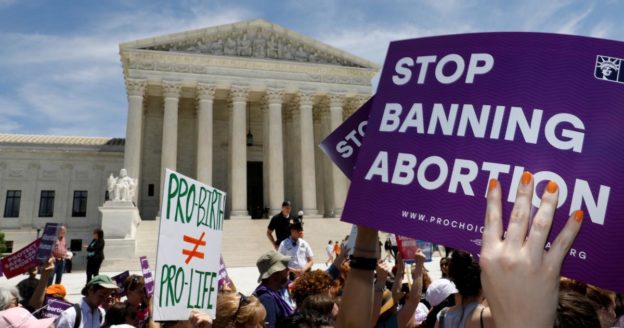After the state of Georgia passed a bill in March restricting voting rights, executives from hundreds of companies, led by former American Express chief Kenneth Chenault and Merck CEO Kenneth Frazier, condemned the law in the name of racial equality. It was the latest sign of how business leaders have become increasingly comfortable weighing in on social issues, speaking out in support of Black Lives Matter, immigrants, and LGBTQ rights.
Now, in the wake of an extremely restrictive new Texas law that effectively bans abortion in the state and encourages civilian bounty hunters to go after anyone seeking out the procedure, the Texas-based dating app makers Bumble and Match have begun raising funds to support reproductive rights. Ride service Lyft also announced that it’s starting a legal defense fund for any drivers sued under the law for aiding women in getting abortions. But the vast majority of companies have been noticeably silent about the law, which the US Supreme Court has thus far upheld, and which is widely viewed not only as impacting women in the state of Texas but posing a broader threat to the federal protections acknowledged in Roe v. Wade.
“Their silence is shameful,” Shelley Alpern, director of shareholder advocacy at social impact investment firm Rhia Ventures, told Fortune. “Their very integrity is at stake.”
So where’s the outrage from the many business leaders who say they support women’s rights and gender equality? MK Chin, an assistant professor of management at Indiana University’s Kelley School of Business, says there are several possible reasons why companies have thus far avoided making public statements.
The public is only selectively supportive of CEO activismAmericans are generally in favor of CEOs speaking out about issues such as income inequality, healthcare, and the environment, according to a 2018 report from the Rock Center for Corporate Governance at Stanford University. But there are some topics that the public prefers CEOs to stay away from. The report found that only 37% of Americans are in favor of CEOs speaking out about abortion, while 39% are against; religion—a topic to which abortion is often linked—was similarly divisive. By comparison, 65% were in favor of CEO activism on the subjects of climate change and sustainability, and 54% supported CEOs discussing racial issues.
This matters because in general, even liberal CEOs tend to follow public opinion, says Chin. His research on companies speaking out about same-sex marriage shows it became increasingly commonplace for CEOs to talk openly about the topic only after public support for same-sex marriage passed the 50% mark in 2011.
Recent polls suggest Americans remain fairly split on the topic of abortion. While an April survey from the Pew Research Center found that 59% of Americans believe abortion should be legal in all or most cases, a May 2021 Gallup poll found that only one-third of Americans say the procedure should be legal under any circumstances, while 48% say it should be legal “only under certain circumstances.”
For CEOs, Chin says, “I can imagine it’s not clear-cut—what kind of ‘certain circumstances’? I think it’s a more complicated issue; in terms of public opinion, I don’t think CEOs are confident enough to jump on this issue.”
The once-is-enough mentalityChin’s research on CEOs weighing in on political issues shows that “the first time speaking out matters much more.” In other words, once executives announce their position on a topic, they’re less inclined to repeat it. He notes that Coca-Cola and Delta bowed to pressure to speak against the Georgia voting restrictions law in the spring, but didn’t join the open letter signed by hundreds of companies a few days later. When reporters asked why, the companies said that they’d already expressed their support once.
The same effect may be playing out when it comes to speaking out on reproductive rights: Back in 2019, nearly 200 CEOs—including Twitter’s Jack Dorsey and the CEOs of Yelp, H&M, The Body Shop, and Glossier—signed a letter condemning legal efforts to roll back women’s access to abortion. Chin theorizes that some CEOs may think that, having offered their support for abortion rights a few years ago, they shouldn’t have to do it again.
Framing mattersThese factors can help explain why some CEOs are hesitant to speak up about a vitally important issue. But it doesn’t mean this will remain the status quo. Chin notes that how social issues are framed can have a big impact on both public opinion and CEOs’ willingness to speak out.
As one example, he says, even liberals didn’t necessarily perceive same-sex marriage as an equality issue back in the 1990s. But over time, it came to be understood as a human rights matter. “That’s when liberals started to appreciate it as a more important issue for society, and CEOs jumped on,” Chin says. “I think it would be similar for abortion rights. If this is framed more as a human rights and gender issue rather than a religious issue, I think that can make CEOs’ decisions easier.”
Access to safe and legal abortion is an important underpinning of the movement for women’s equality—an issue that many business leaders profess to care about. The more that public discourse clarifies that abortion access is about human rights and women’s equality rather than religious beliefs, the more pressure CEOs will presumably feel to take action.

Comments are closed